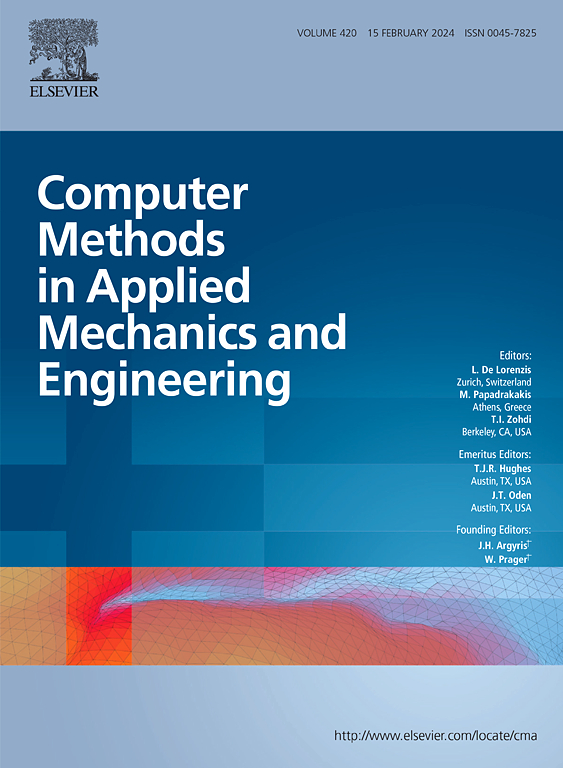Reliability-based topology optimization using LRPIM surrogate model considering local stress and displacement constraints
IF 6.9
1区 工程技术
Q1 ENGINEERING, MULTIDISCIPLINARY
Computer Methods in Applied Mechanics and Engineering
Pub Date : 2024-10-16
DOI:10.1016/j.cma.2024.117460
引用次数: 0
Abstract
This paper presents a novel decoupled framework for reliability-based topology optimization (RBTO) that aims to find optimal material configurations while meeting local stiffness and strength constraints. To effectively address the nonlinear displacement and stress reliability constraints, the proposed framework replaces the conventional first-order reliability method (FORM) with the more accurate Local Radial Point Interpolation Method (LRPIM). This substitution overcomes the limitations of FORM in approximating high-dimensional nonlinear problems. The framework includes the qp-relaxation criterion and a global stress aggregation technique to avoid stress singularities. For multi-constrained optimization, the adjoint vector method is used for design sensitivity analysis, followed by a gradient-based algorithm to solve the structural optimization problem. Numerical examples are presented to validate the effectiveness of the proposed RBTO methodology, demonstrating its superiority in both accuracy and reliability compared to the Sequential Optimization and Reliability Assessment (SORA) method. The comparative analysis highlights the efficiency and precision of the proposed method across different reliability approaches, making it a robust tool for addressing complex engineering challenges.
利用考虑局部应力和位移约束的 LRPIM 代用模型进行基于可靠性的拓扑优化
本文提出了一种新颖的基于可靠性的拓扑优化(RBTO)解耦框架,旨在找到最佳材料配置,同时满足局部刚度和强度约束。为有效解决非线性位移和应力可靠性约束,本文提出的框架用更精确的局部径向点插值法(LRPIM)取代了传统的一阶可靠性方法(FORM)。这种替代方法克服了 FORM 在逼近高维非线性问题时的局限性。该框架包括 qp 松弛准则和全局应力聚集技术,以避免应力奇点。在多约束优化方面,使用邻接向量法进行设计敏感性分析,然后使用基于梯度的算法解决结构优化问题。通过数值示例验证了所提出的 RBTO 方法的有效性,证明其与顺序优化和可靠性评估(SORA)方法相比,在准确性和可靠性方面都更胜一筹。对比分析凸显了拟议方法在不同可靠性方法中的效率和精确性,使其成为应对复杂工程挑战的强大工具。
本文章由计算机程序翻译,如有差异,请以英文原文为准。
求助全文
约1分钟内获得全文
求助全文
来源期刊
CiteScore
12.70
自引率
15.30%
发文量
719
审稿时长
44 days
期刊介绍:
Computer Methods in Applied Mechanics and Engineering stands as a cornerstone in the realm of computational science and engineering. With a history spanning over five decades, the journal has been a key platform for disseminating papers on advanced mathematical modeling and numerical solutions. Interdisciplinary in nature, these contributions encompass mechanics, mathematics, computer science, and various scientific disciplines. The journal welcomes a broad range of computational methods addressing the simulation, analysis, and design of complex physical problems, making it a vital resource for researchers in the field.

 求助内容:
求助内容: 应助结果提醒方式:
应助结果提醒方式:


